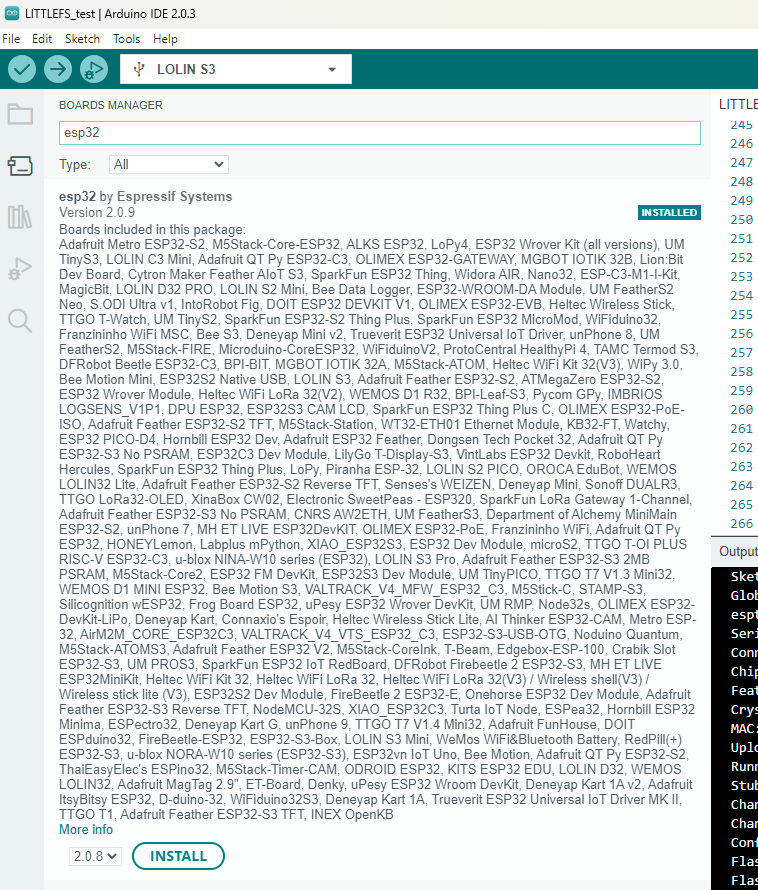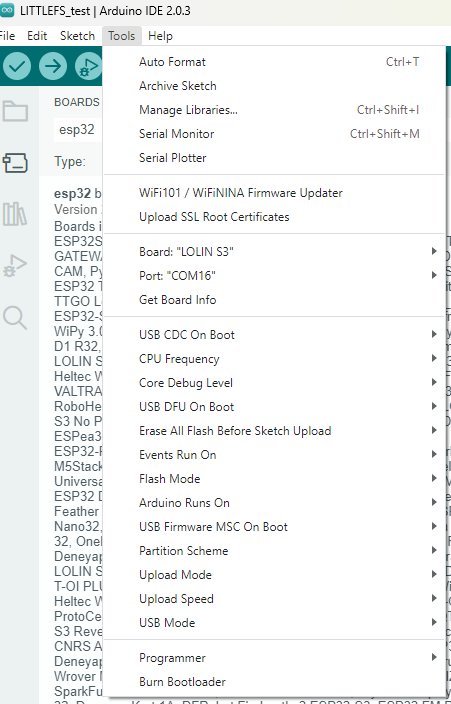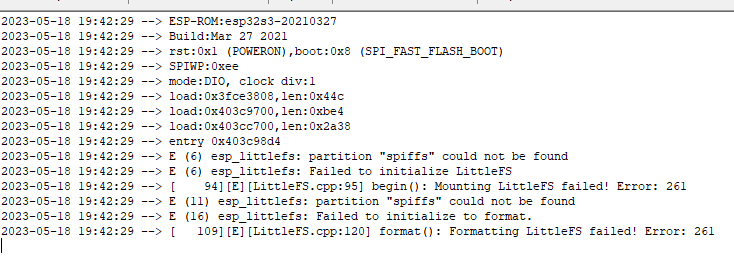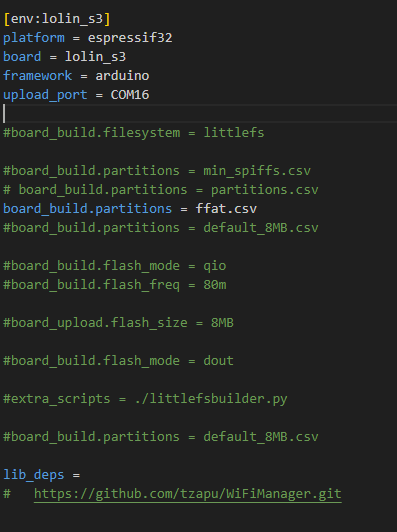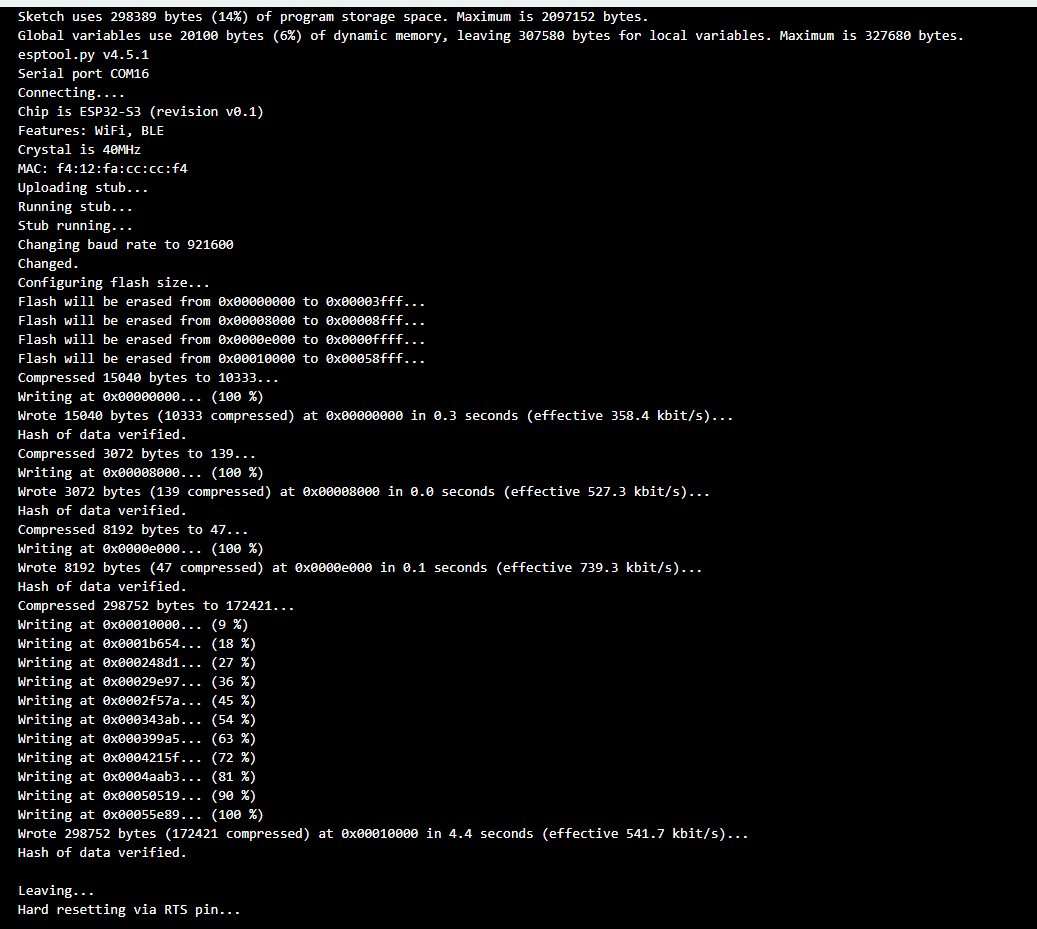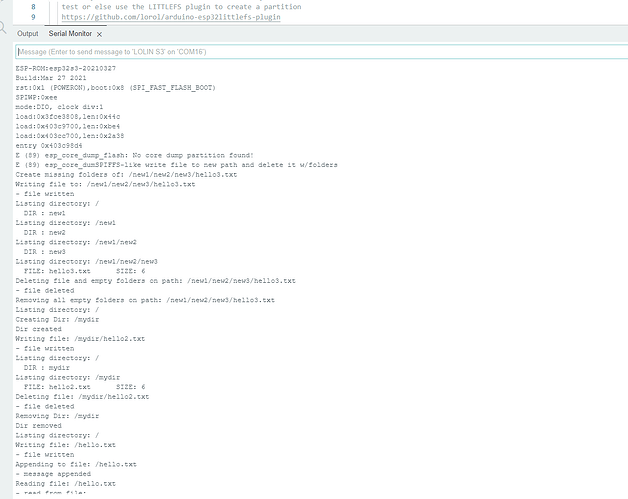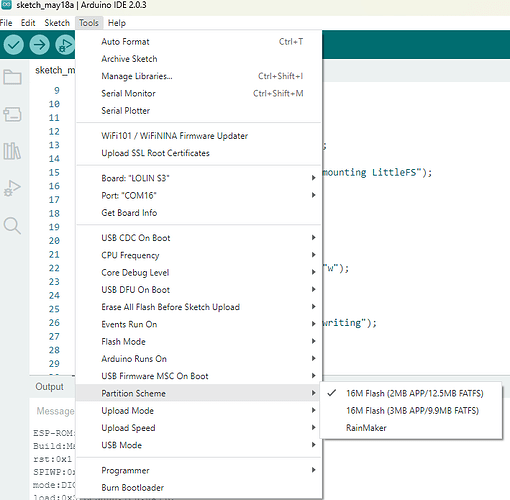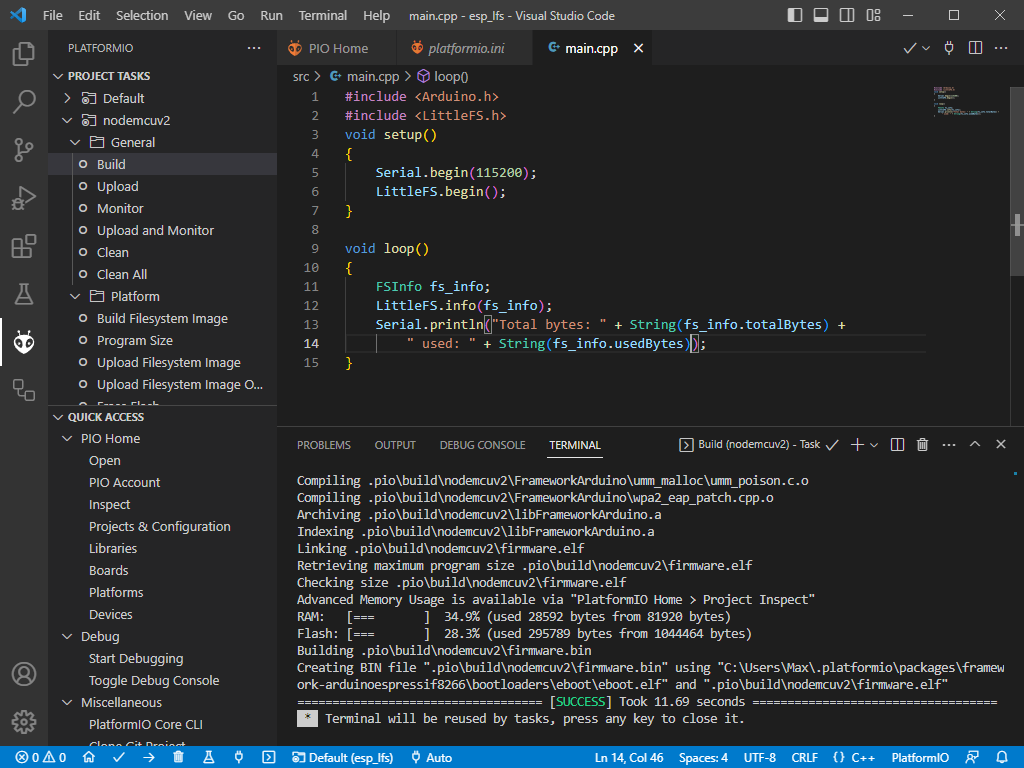got me confused too… here are details:
here is Serial output:
here is code:
// #include <Arduino.h>
// #include <WiFiManager.h> // https://github.com/tzapu/WiFiManager
#include "FS.h"
#include <LittleFS.h>
/* You only need to format LittleFS the first time you run a
test or else use the LITTLEFS plugin to create a partition
https://github.com/lorol/arduino-esp32littlefs-plugin
If you test two partitions, you need to use a custom
partition.csv file, see in the sketch folder */
//WiFiManager, Local intialization. Once its business is done, there is no need to keep it around
// WiFiManager wm;
//#define TWOPART
#define FORMAT_LITTLEFS_IF_FAILED true
void listDir(fs::FS &fs, const char * dirname, uint8_t levels){
Serial.printf("Listing directory: %s\r\n", dirname);
File root = fs.open(dirname);
if(!root){
Serial.println("- failed to open directory");
return;
}
if(!root.isDirectory()){
Serial.println(" - not a directory");
return;
}
File file = root.openNextFile();
while(file){
if(file.isDirectory()){
Serial.print(" DIR : ");
Serial.println(file.name());
if(levels){
listDir(fs, file.path(), levels -1);
}
} else {
Serial.print(" FILE: ");
Serial.print(file.name());
Serial.print("\tSIZE: ");
Serial.println(file.size());
}
file = root.openNextFile();
}
}
void createDir(fs::FS &fs, const char * path){
Serial.printf("Creating Dir: %s\n", path);
if(fs.mkdir(path)){
Serial.println("Dir created");
} else {
Serial.println("mkdir failed");
}
}
void removeDir(fs::FS &fs, const char * path){
Serial.printf("Removing Dir: %s\n", path);
if(fs.rmdir(path)){
Serial.println("Dir removed");
} else {
Serial.println("rmdir failed");
}
}
void readFile(fs::FS &fs, const char * path){
Serial.printf("Reading file: %s\r\n", path);
File file = fs.open(path);
if(!file || file.isDirectory()){
Serial.println("- failed to open file for reading");
return;
}
Serial.println("- read from file:");
while(file.available()){
Serial.write(file.read());
}
file.close();
}
void writeFile(fs::FS &fs, const char * path, const char * message){
Serial.printf("Writing file: %s\r\n", path);
File file = fs.open(path, FILE_WRITE);
if(!file){
Serial.println("- failed to open file for writing");
return;
}
if(file.print(message)){
Serial.println("- file written");
} else {
Serial.println("- write failed");
}
file.close();
}
void appendFile(fs::FS &fs, const char * path, const char * message){
Serial.printf("Appending to file: %s\r\n", path);
File file = fs.open(path, FILE_APPEND);
if(!file){
Serial.println("- failed to open file for appending");
return;
}
if(file.print(message)){
Serial.println("- message appended");
} else {
Serial.println("- append failed");
}
file.close();
}
void renameFile(fs::FS &fs, const char * path1, const char * path2){
Serial.printf("Renaming file %s to %s\r\n", path1, path2);
if (fs.rename(path1, path2)) {
Serial.println("- file renamed");
} else {
Serial.println("- rename failed");
}
}
void deleteFile(fs::FS &fs, const char * path){
Serial.printf("Deleting file: %s\r\n", path);
if(fs.remove(path)){
Serial.println("- file deleted");
} else {
Serial.println("- delete failed");
}
}
// SPIFFS-like write and delete file, better use #define CONFIG_LITTLEFS_SPIFFS_COMPAT 1
void writeFile2(fs::FS &fs, const char * path, const char * message){
if(!fs.exists(path)){
if (strchr(path, '/')) {
Serial.printf("Create missing folders of: %s\r\n", path);
char *pathStr = strdup(path);
if (pathStr) {
char *ptr = strchr(pathStr, '/');
while (ptr) {
*ptr = 0;
fs.mkdir(pathStr);
*ptr = '/';
ptr = strchr(ptr+1, '/');
}
}
free(pathStr);
}
}
Serial.printf("Writing file to: %s\r\n", path);
File file = fs.open(path, FILE_WRITE);
if(!file){
Serial.println("- failed to open file for writing");
return;
}
if(file.print(message)){
Serial.println("- file written");
} else {
Serial.println("- write failed");
}
file.close();
}
void deleteFile2(fs::FS &fs, const char * path){
Serial.printf("Deleting file and empty folders on path: %s\r\n", path);
if(fs.remove(path)){
Serial.println("- file deleted");
} else {
Serial.println("- delete failed");
}
char *pathStr = strdup(path);
if (pathStr) {
char *ptr = strrchr(pathStr, '/');
if (ptr) {
Serial.printf("Removing all empty folders on path: %s\r\n", path);
}
while (ptr) {
*ptr = 0;
fs.rmdir(pathStr);
ptr = strrchr(pathStr, '/');
}
free(pathStr);
}
}
void testFileIO(fs::FS &fs, const char * path){
Serial.printf("Testing file I/O with %s\r\n", path);
static uint8_t buf[512];
size_t len = 0;
File file = fs.open(path, FILE_WRITE);
if(!file){
Serial.println("- failed to open file for writing");
return;
}
size_t i;
Serial.print("- writing" );
uint32_t start = millis();
for(i=0; i<2048; i++){
if ((i & 0x001F) == 0x001F){
Serial.print(".");
}
file.write(buf, 512);
}
Serial.println("");
uint32_t end = millis() - start;
Serial.printf(" - %u bytes written in %u ms\r\n", 2048 * 512, end);
file.close();
file = fs.open(path);
start = millis();
end = start;
i = 0;
if(file && !file.isDirectory()){
len = file.size();
size_t flen = len;
start = millis();
Serial.print("- reading" );
while(len){
size_t toRead = len;
if(toRead > 512){
toRead = 512;
}
file.read(buf, toRead);
if ((i++ & 0x001F) == 0x001F){
Serial.print(".");
}
len -= toRead;
}
Serial.println("");
end = millis() - start;
Serial.printf("- %u bytes read in %u ms\r\n", flen, end);
file.close();
} else {
Serial.println("- failed to open file for reading");
}
}
void setup(){
Serial.begin(115200);
#ifdef TWOPART
if(!LittleFS.begin(FORMAT_LITTLEFS_IF_FAILED, "/lfs2", 5, "part2")){
Serial.println("part2 Mount Failed");
return;
}
appendFile(LittleFS, "/hello0.txt", "World0!\r\n");
readFile(LittleFS, "/hello0.txt");
LittleFS.end();
Serial.println( "Done with part2, work with the first lfs partition..." );
#endif
if(!LittleFS.begin(FORMAT_LITTLEFS_IF_FAILED)){
Serial.println("LittleFS Mount Failed");
return;
}
Serial.println( "SPIFFS-like write file to new path and delete it w/folders" );
writeFile2(LittleFS, "/new1/new2/new3/hello3.txt", "Hello3");
listDir(LittleFS, "/", 3);
deleteFile2(LittleFS, "/new1/new2/new3/hello3.txt");
listDir(LittleFS, "/", 3);
createDir(LittleFS, "/mydir");
writeFile(LittleFS, "/mydir/hello2.txt", "Hello2");
listDir(LittleFS, "/", 1);
deleteFile(LittleFS, "/mydir/hello2.txt");
removeDir(LittleFS, "/mydir");
listDir(LittleFS, "/", 1);
writeFile(LittleFS, "/hello.txt", "Hello ");
appendFile(LittleFS, "/hello.txt", "World!\r\n");
readFile(LittleFS, "/hello.txt");
renameFile(LittleFS, "/hello.txt", "/foo.txt");
readFile(LittleFS, "/foo.txt");
deleteFile(LittleFS, "/foo.txt");
testFileIO(LittleFS, "/test.txt");
deleteFile(LittleFS, "/test.txt");
Serial.println( "Test complete" );
bool res;
// res = wm.autoConnect(); // auto generated AP name from chipid
// res = wm.autoConnect("AutoConnectAP"); // anonymous ap
// res = wm.autoConnect("AutoConnectAP","password"); // password protected ap
if(!res) {
Serial.println("Failed to connect");
// ESP.restart();
}
else {
//if you get here you have connected to the WiFi
Serial.println("connected...yeey :)");
}
}
void loop(){
}
partition table selected:

